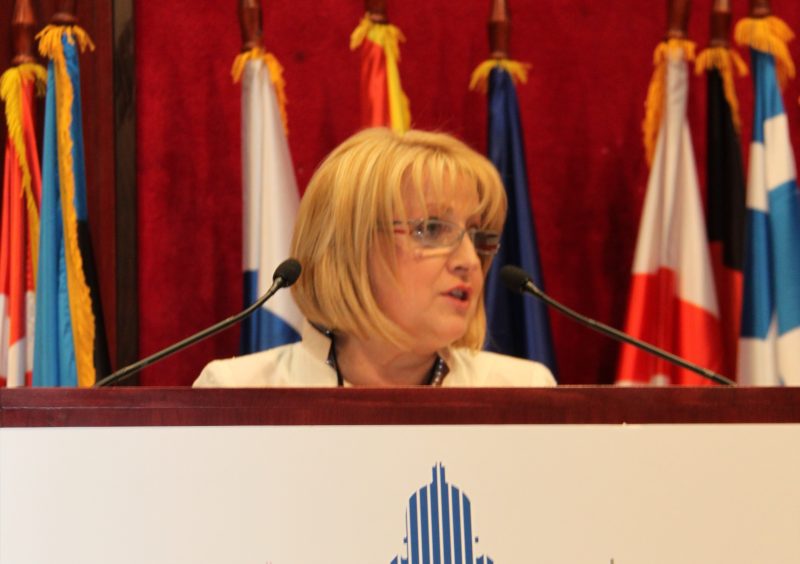Serbian government officials are claiming that uproar over alleged plans to establish a state body to persuade women to avoid abortions is all a misunderstanding.
Slavica Đukić Dejanović, a minister without portfolio responsible for demography and population policy, reportedly told pro-government tabloid Informer confirming that the state would “form a body that would raise awareness of all women about the harmful side effects of abortions.” Several other media outlets then picked up on the statement. According to news portal Alo.rs, the council would provide counseling on pregnancy and its termination, and “would include the civil sector, priests and various experts that would be able to help.”
With a population of about 7 million inhabitants, domestic media claim Serbia has one of the highest abortion rates in Europe, allegedly with 200,000 procedures per year that mostly go unreported. The official figure from the Institute for Public Health for 2015 is 16,863 abortions.
Initial news about this council claimed that the idea came from Russia, “a leading country by number of abortions.” Alo.rs quoted demographer Biljana Spasić, who praised the Russian model based on cooperation between the state and the church. According to her, mandatory counseling by psychologists and priests who “encourage women to preserve the life they carry in their belly” lowered the number of abortions.
Public reactions to the proposed counseling body were harsh.
Bilo kakva zabrana abortusa bi povećala broj NELEGALNIH intervencija, rizik od infekcija i veću smrtnost žena.#Abortus #Zdravstvo
— Dusan Milisavljevic (@DusanORLDusan) December 23, 2016
Any kind of prohibition of abortions would increase the number of ILLEGAL interventions, risk of infections and mortality of women. #Abortion #Health
Znate šta je posledica zabrane abortusa? Klinike u susedstvu trljaju ruke, a priučeni kasapi se igraju sa životima sirotinje.
— AleksandarStevanovic (@Stevanovich_A) December 24, 2016
You know the consequence of prohibition of abortion? Profit for the clinics in neighboring countries, and semi-skilled butchers playing with the lives of the poor.
Renowned film director Srđan Dragojević addressed the role of the Serbian Orthodox Church and its tax-exempt status.
Crkva bi mogla da placa porez a da ta davanja idu za mere koje pospesuju natalitet. A ne – borba protiv abortusa. Sve, zaboga, Naopako!
— Srdjan Dragojevic (@srdjandrago) December 23, 2016
The Church could start paying taxes, and those funds could be spent for measures that would increase the birthrate. But no, they choose to fight abortion. Everything, for God's sake, is turned upside down!
Minister Đukić Dejanović then issued a denial, published by Informer, noting that women's right to continue or terminate her pregnancy is “unalienable”:
- Neće biti formiran savet kao posebno telo, već će se pojačati rad u savetovalistima koja već postoje i u koja ćemo uključiti eksperte drugih struka – rekla je ona.
No council would be formed as a separate body, but the government intends to increase the counseling work in existing clinics, and we'll include experts from other fields, said the minister.
Serbian Deputy Prime Minister Zorana Mihajlovic also issued a statement, reaffirming the last message by the minister. She said that no anti-abortion council would be formed, but that the country needs a council for increasing the birthrate. She also denied collusion of the state with the church (which advocates prohibition of abortion) because “the next step would be campaigns that would put women who abort on the Pillar of Shame,” which would be undemocratic.
Serbian officials who want to clamp down on abortion wouldn't have to look far to see what possible consequences lie in wait. In 2013, Macedonia made changes to the country's abortion law that stipulated increased bureaucratic procedures including mandatory counseling sessions intended to persuade women not to abort, as well as threats of punishments for doctors. In parallel, anti-abortion media campaigns fueled the abortion stigma. Since then, the number of illegal abortions has risen, as well as in number of documented cases of women whose health was endangered due to denial of abortion.
Macedonia also has one of the highest infant mortality rates in Europe, and in recent years media have been reporting an increase in the number of infant deaths in state clinics. Some observers have suggested this is related to serious birth defects in infants who would have been a candidate for abortion if proper screenings and procedures were undertaken on time.
Most nationalist ideologies found in the Balkans include a segment that tries to incite feelings of guilt in young people who choose not to give birth to “enough” children to maintain “ethnic balance.” In Croatia since the 1990s and in Macedonia after 2006, anti-abortion projects have become part of state policies. Such policies rarely take into account the factors forcing young people to migrate from their home countries in droves, reducing the number of potential would-be-parents.
In the 1990s in Serbia, during the reign of Slobodan Milošević, state propaganda used the term “White Plague” (“bela kuga”) analogous to the Medieval Black Death, to increase the level of fear over depopulation. Current Serbian Prime Minister Aleksandar Vučić served as minister of information under that regime (1998-2000).








1 comment